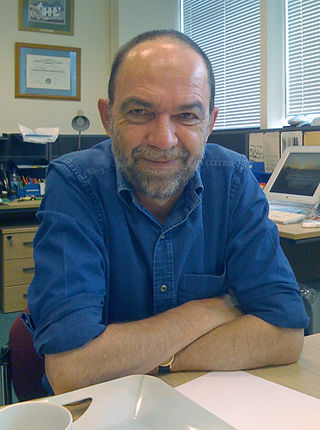Related Research Articles

Sir Alec John Jeffreys, is a British geneticist known for developing techniques for genetic fingerprinting and DNA profiling which are now used worldwide in forensic science to assist police detective work and to resolve paternity and immigration disputes.

Luigi Luca Cavalli-Sforza was an Italian geneticist. He was a population geneticist who taught at the University of Parma, the University of Pavia and then at Stanford University.

Edmund Brisco "Henry" Ford was a British ecological geneticist. He was a leader among those British biologists who investigated the role of natural selection in nature. As a schoolboy Ford became interested in lepidoptera, the group of insects which includes butterflies and moths. He went on to study the genetics of natural populations, and invented the field of ecological genetics. Ford was awarded the Royal Society's Darwin Medal in 1954. In the wider world his best known work is Butterflies (1945).

In biology, polymorphism is the occurrence of two or more clearly different morphs or forms, also referred to as alternative phenotypes, in the population of a species. To be classified as such, morphs must occupy the same habitat at the same time and belong to a panmictic population.

Sir Cyril Astley Clarke was a British physician, geneticist and lepidopterist. He was honoured for his pioneering work on prevention of Rh disease of the newborn, and also for his work on the genetics of the Lepidoptera.
Professor Philip MacDonald Sheppard, F.R.S. was a British geneticist and lepidopterist. He made advances in ecological and population genetics in lepidopterans, pulmonate land snails and humans. In medical genetics, he worked with Cyril Clarke on Rh disease.
Sir Thomas Richard Edmund SouthwoodGOM DL FRS was a British biologist, professor of zoology and vice-chancellor of the University of Oxford. A specialist on entomology, he developed the field of insect ecology and the development of study techniques. He wrote a landmark textbook on Ecological Methods that went into numerous editions. He also was well known for developing the field of entomology through mentorship of a circle of researchers at Silwood Park.
Cyril Dean Darlington was an English biologist, cytologist, geneticist, and eugenicist. He discovered the mechanics of chromosomal crossover, its role in inheritance, and thus its importance to evolution. He was the Sherardian Professor of Botany at the University of Oxford from 1953 to 1971.

Sir Walter Fred Bodmer is a German-born British human geneticist.
Arthur James Cain FRS was a British evolutionary biologist and ecologist. He was elected a Fellow of the Royal Society in 1989.

Dame Kay Elizabeth Davies is a British geneticist. She is Dr Lee's Professor of Anatomy at the University of Oxford and a Fellow of Hertford College, Oxford. She is director of the Medical Research Council (MRC) functional genetics unit, a governor of the Wellcome Trust, a director of the Oxford Centre for Gene Function, and a patron and Senior Member of Oxford University Scientific Society. Her research group has an international reputation for work on Duchenne muscular dystrophy (DMD). In the 1980s, she developed a test which allowed for the screening of foetuses whose mothers have a high risk of carrying DMD.

The Department of Biochemistry of Oxford University is located in the Science Area in Oxford, England. It is one of the largest biochemistry departments in Europe. The Biochemistry Department is part of the University of Oxford's Medical Sciences Division, the largest of the university's four academic divisions, which has been ranked first in the world for biomedicine.
The School of Biological Sciences is a School within the Faculty Biology, Medicine and Health at The University of Manchester. Biology at University of Manchester and its precursor institutions has gone through a number of reorganizations, the latest of which was the change from a Faculty of Life Sciences to the current School.
The Faculty of History at the University of Oxford organises that institution's teaching and research in medieval and modern history. Medieval and modern history has been taught at Oxford for longer than at virtually any other university, and the first Regius Professor of Modern History was appointed in 1724. The Faculty is part of the Humanities Division, and has been based at the former City of Oxford High School for Boys on George Street, Oxford since the summer of 2007, while the department's library relocated from the former Indian Institute on Catte Street to the Bodleian Library's Radcliffe Camera in August 2012.
Peter Neville Goodfellow, is a British geneticist best known for his work on sex determination and the SRY gene that encodes testis determining factor. He was Arthur Balfour Professor of Genetics at the University of Cambridge from 1992 to 1996.

Lady Julia Gwynaeth Bodmer was a British geneticist and trained economist. Involved in the discovery and definition of the human leukocyte antigen (HLA) system of genetic markers, Bodmer became one of the world's leading experts in HLA serology and the genetic definition of the HLA system. A prominent figure in the field of immunogenetics, her discoveries helped the understanding and development of knowledge about HLA associations with diseases including acquired immunodeficiency syndrome (AIDS) and cancer. As well as being a distinguished scientist in her own right, she collaborated throughout her career with her husband, the human and cancer geneticist Sir Walter Bodmer. The couple had three children.
The various academic faculties, departments, and institutes of the University of Oxford are organised into four divisions, each with its own Head and elected board. They are the Humanities Division; the Social Sciences Division; the Mathematical, Physical and Life Sciences Division; and the Medical Sciences Division.
The Dr Lee's Professorships are three named statutory professorships of the University of Oxford. They were created in 1919, and are named after Matthew Lee (1695–1755) who had endowed three readerships at Christ Church, Oxford, in the 19th century.

Caroline Pellew was a British geneticist who made significant contributions to knowledge of the laws of inheritance in various organisms including peas.
Graeme Paul Doran is an English geneticist and a former first-class cricketer.
References
- 1 2 3 4 "Sir Walter Bodmer and the Department of Genetics at University of Oxford". Archives and Manuscripts at the Bodleian Library. Retrieved 14 November 2017.
- ↑ Conversation with Sir Walter Bodmer, Oxford, September 2017
- ↑ "Biography of Sir Walter Bodmer, FMedSci, FRS". The Royal Society. Retrieved 14 November 2017.
- 1 2 "The Bodmer Archive". Archives and Manuscripts at the Bodleian Library. Retrieved 14 November 2017.
- ↑ "Genes, Genetics, Epigenetics and Genomics". Graduate School, Medical Sciences Division, University of Oxford. Retrieved 14 November 2017.
- ↑ "Department of Biochemistry, University of Oxford" . Retrieved 14 November 2017.